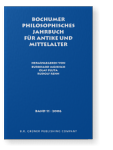Aristoteles und der naturalistische Fehlschluß
Is Aristotle’s ethics founded on a naturalistic fallacy? This article examines in detail the criticism which was levelled at Aristotle by George Edward Moore in his Principia Ethica in 1903. In order to check the correctness of this assumption, Aristotle’s notion of goodness is reconstructed by an analysis of his theoretical as well as his ethical writings. The picture which emerges shows that Aristotle does not understand goodness as a univocal term but as an analogical concept the focal meaning of which is closely related to the perfection of the different natural things or species. Since Moore’s criticism presupposes a univocal definition of goodness, Aristotle’s treatment of this notion does not fall prey to it. Although his understanding of goodness is connected with his teleology of nature, Aristotle is not guilty of deriving ›ought‹ from ›is‹; therefore, his ethics is also immune to the second argument against the naturalistic fallacy which is usually traced back to David Hume.
Article language: German
